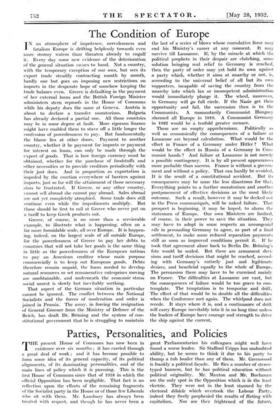The Condition of Europe
IN an atmosphere of impotence, nervelessness and
fatalism Europe is drifting helplessly towards even more stormy waters than threaten already to engulf it. Every day some new evidence of the deterioration of the general situation comes to hand. Not a country, with the temporary exception of our own, but sees its export trade steadily contracting month by month; hardly one but goes on imposing new restrictions on imports in the desperate hope of somehow keeping the trade balance even. Greece is defaulting in the payment of her external loans and the British Foreign Minister administers stern reproofs in the House of Commons while his deputy does the same at Geneva. Austria is about to declare a transfer moratorium. Bulgaria has already declared a partial one. All those countries may be in some degree at fault. More rigorous finance might have enabled them to stave off a little longer the confession of powerlessness to pay. But fundamentally the blame lies at other doors. Payment to another country, whether it be payment for imports or payment for interest on loans, can only be made through the export of goods. That is how foreign currency must be obtained, whether for the purchase of foodstuffs and other necessities or to provide creditors periodically with their just dues. And in proportion as exportation is impeded by the erection everywhere of barriers against imports, just so far will the attainment of those necessary aims be frustrated. If Greece, or any other country, cannot sell abroad she cannot pay abroad. Sales abroad are not yet completely atrophied. Some trade does still continue even while the impediments multiply. But those should be first to rail at Greece who never put on a tariff to keep Greek products out. Greece, of course, is no more than a serviceable example, to illustrate what is happening, often on a far more formidable scale, all over Europe. It is happen, ing, indeed, on the largest scale of all outside Europe, for the powerlessness of Greece to pay her debts to countries that will not take her goods is the same thing in little as the powerlessness of the European nations to pay an American creditor whose main purpose commercially is to keep out European goods. Debts therefore remain unpaid, the loans needed to develop natural resources or set remunerative enterprises moving are unobtainable, and underneath the economic stress social unrest is slowly but inevitably seething. That aspect of the German situation in particular cannot be ignored. The conflict between the National Socialists and the forces of Moderation and order is joined in Prussia. The army, in forcing the resignation of General Groener from the Ministry of Defence of the Reich, has dealt Dr. Bruning and the system of con- stitutional government that he is struggling to maintain the last of a series of blows whose cumulative force may end his Ministry's career at any moment. It may survive till Lausanne. If, by the miracle at which the political prophets in their despair are clutching, some solution bringing real relief to Germany is reached, then the party of order may yet hold its own against a party which, whether it aims at anarchy or not, is, according to the universal belief of all but its own supporters, incapable of saving the country from the anarchy into which lax or incompetent administration would immediately plunge it. The wheel, moreover, in Germany will go full circle. If the Nazis get their opportunity and fail, the succession then is to the Comthunists. A momentarily Communist Hungary alarmed all Europe in 1919. A Communist Germany in 1932 would be a tenfold greater menace. These are no empty apprehensions. Politically as well as economically the consequences of a failure at Lausanne are beyond calculation. What would be the effect in France of a Germany under Hitler ? What would be the effect in Russia of a Germany in Com- munist hands ? And failure at Lausanne is not merely a possible contingency. It is by all -present appearances more probable than success. France is without a govern- ment and without a policy. That can hardly be avoided. It is the result of a constitutional accident. But its consequences may be none the less disastrous for that. Everything points to a further moratorium and another postponement of effective decisions as the most likely outcome. Such a result, however it may be decked out in the Press communiques, will be naked failure. That prospect is beginning, it may be hoped, to alarm the statesmen of Europe. Our own Ministers are limited, of course, in their power to save the situation. They may have to adopt in some respects an uncongenial role in persuading Germany to agree, as part of a final settlement, to make some reduced reparation payments still as soon as improved conditions permit it. If he took that agreement alone back to Berlin Dr. Briining's fate would be sealed. But there are armament deci- sions and tariff decisions that might be reached, accord- ing with Germany's entirely . just and legitimate desires, and beneficial equally to the whole of Europe. The persuasion there may have to be exercised mainly on France. The difficulties at Lausanne are vast, but the consequences of failure would be too grave to con- template. The temptation is to temporize and drift. The effect of that would be to double all the difficulties when the Conference met again. The whirlpool does not recede. It stays where it is, and a continuance of drift will carry Europe inevitably into it in no long time unless the leaders of Europe have courage and strength to drive the ship against the current.








































 Previous page
Previous page